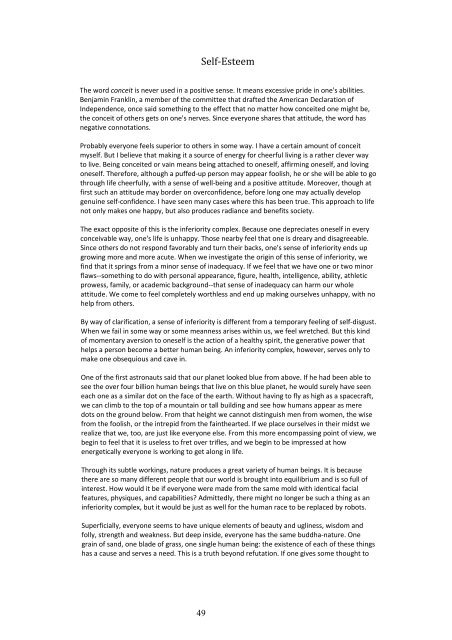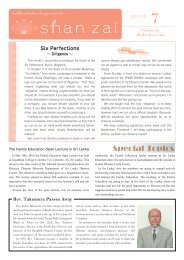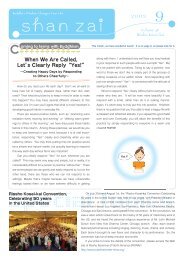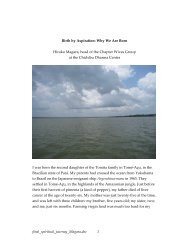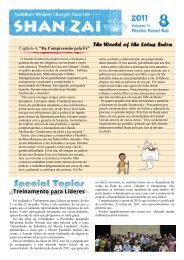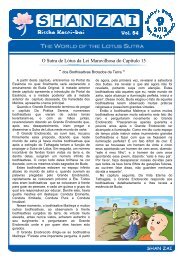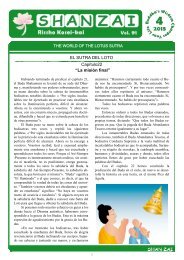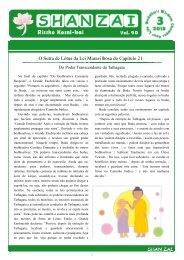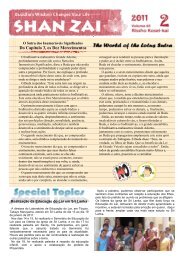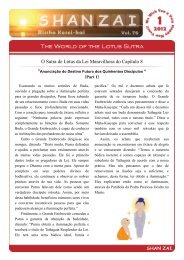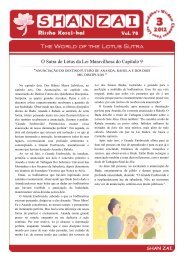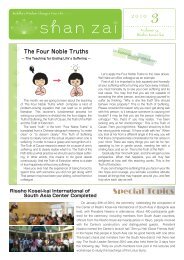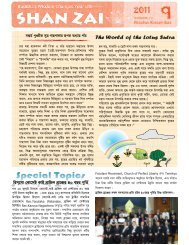Create successful ePaper yourself
Turn your PDF publications into a flip-book with our unique Google optimized e-Paper software.
Self‐EsteemThe word conceit is never used in a positive sense. It means excessive pride in one's abilities.Benjamin Franklin, a member of <strong>the</strong> committee that drafted <strong>the</strong> American Declaration ofIndependence, once said something <strong>to</strong> <strong>the</strong> effect that no matter how conceited one might be,<strong>the</strong> conceit of o<strong>the</strong>rs gets on one's nerves. Since everyone shares that attitude, <strong>the</strong> word hasnegative connotations.Probably everyone feels superior <strong>to</strong> o<strong>the</strong>rs in some way. I have a certain amount of conceitmyself. But I believe that making it a source of energy for cheerful living is a ra<strong>the</strong>r clever way<strong>to</strong> live. Being conceited or vain means being attached <strong>to</strong> oneself, affirming oneself, and lovingoneself. Therefore, although a puffed‐up person may appear foolish, he or she will be able <strong>to</strong> gothrough life cheerfully, with a sense of well‐being and a positive attitude. Moreover, though atfirst such an attitude may border on overconfidence, before long one may actually developgenuine self‐confidence. I have seen many cases where this has been true. This approach <strong>to</strong> lifenot only makes one happy, but also produces radiance and benefits society.The exact opposite of this is <strong>the</strong> inferiority complex. Because one depreciates oneself in everyconceivable way, one's life is unhappy. Those nearby feel that one is dreary and disagreeable.Since o<strong>the</strong>rs do not respond favorably and turn <strong>the</strong>ir backs, one's sense of inferiority ends upgrowing more and more acute. When we investigate <strong>the</strong> origin of this sense of inferiority, wefind that it springs from a minor sense of inadequacy. If we feel that we have one or two minorflaws‐‐something <strong>to</strong> do with personal appearance, figure, health, intelligence, ability, athleticprowess, family, or academic background‐‐that sense of inadequacy can harm our wholeattitude. We come <strong>to</strong> feel completely worthless and end up making ourselves unhappy, with nohelp from o<strong>the</strong>rs.By way of clarification, a sense of inferiority is different from a temporary feeling of self‐disgust.When we fail in some way or some meanness arises within us, we feel wretched. But this kindof momentary aversion <strong>to</strong> oneself is <strong>the</strong> action of a healthy spirit, <strong>the</strong> generative power tha<strong>the</strong>lps a person become a better human being. An inferiority complex, however, serves only <strong>to</strong>make one obsequious and cave in.One of <strong>the</strong> first astronauts said that our planet looked blue from above. If he had been able <strong>to</strong>see <strong>the</strong> over four billion human beings that live on this blue planet, he would surely have seeneach one as a similar dot on <strong>the</strong> face of <strong>the</strong> earth. Without having <strong>to</strong> fly as high as a spacecraft,we can climb <strong>to</strong> <strong>the</strong> <strong>to</strong>p of a mountain or tall building and see how humans appear as meredots on <strong>the</strong> ground below. From that height we cannot distinguish men from women, <strong>the</strong> wisefrom <strong>the</strong> foolish, or <strong>the</strong> intrepid from <strong>the</strong> fain<strong>the</strong>arted. If we place ourselves in <strong>the</strong>ir midst werealize that we, <strong>to</strong>o, are just like everyone else. From this more encompassing point of view, webegin <strong>to</strong> feel that it is useless <strong>to</strong> fret over trifles, and we begin <strong>to</strong> be impressed at howenergetically everyone is working <strong>to</strong> get along in life.Through its subtle workings, nature produces a great variety of human beings. It is because<strong>the</strong>re are so many different people that our world is brought in<strong>to</strong> equilibrium and is so full ofinterest. How would it be if everyone were made from <strong>the</strong> same mold with identical facialfeatures, physiques, and capabilities? Admittedly, <strong>the</strong>re might no longer be such a thing as aninferiority complex, but it would be just as well for <strong>the</strong> human race <strong>to</strong> be replaced by robots.Superficially, everyone seems <strong>to</strong> have unique elements of beauty and ugliness, wisdom andfolly, strength and weakness. But deep inside, everyone has <strong>the</strong> same buddha‐nature. Onegrain of sand, one blade of grass, one single human being: <strong>the</strong> existence of each of <strong>the</strong>se thingshas a cause and serves a need. This is a truth beyond refutation. If one gives some thought <strong>to</strong>49


